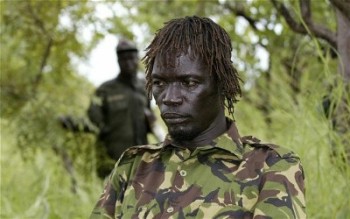Top LRA commander captured in Congo
By Timothy Nsubuga
14th May 2012:
Ugandan Peoples Defence Forces [UPDF] soldiers have captured a senior commander of Joseph Kony’s Lord’s Resistance Army [LRA] after a brief battle with the rebels near the Congo-Central African Republic border, a senior UPDF officer has said.
Lt. Col. Abdul Rugumayo said on Sunday, Caesar Acellam, the fourth most senior LRA commander was captured on Saturday with two other rebel fighters. Rugumayo said Acellam was in a group of about 30 LRA rebels, but others escaped.
Although Acellam is not one of the LRA commanders indicted along with Kony in 2005 by the International Criminal Court, Lt. Col. Abdul Rugumayo said he was one of Kony’s top most military strategists.
A twitter post by Uganda Journalist Angelo Izama however pours cold water on the UPDF’s supposed success in capturing Acellam. According to Izama, Ceaser Acellam has been on the “defection shelf” for a while, which suggests that the LRA commander may have surrendered to the UPDF as opposed to being captured in battle.
LRA on the run
Kony recently became the focus of international attention after the US advocacy group Invisible Children made an online video seeking to make him famous. US forces are helping Ugandan troops find Kony and his top lieutenants.
The United Nations-backed military initiative launched recently by the African Union against the Lord’s Resistance Army (LRA) has kept its members constantly on the move and unable to settle down in any one place for long, a UN envoy has said.
In March, the African Union launched the UN-supported Regional Cooperation Initiative against the LRA (RCI-LRA) and its military component, the Regional Task Force (RTF), to hunt down the LRA and its leader, Joseph Kony – with troops drawn from the four countries affected by the group’s depredations – Uganda, Democratic Republic of the Congo (DRC), South Sudan and the Central African Republic.
“…I think because of the renewed commitment of the four countries, the LRA group don’t have any time to settle down any more,” the Special Representative of the Secretary-General and head of the UN Office for Central Africa (UNOCA), Abou Moussa, said in an interview. “They move a lot, but I am sure they will have to abandon [that] in the end.”
Formed in the 1980s, the LRA has been accused of attacking civilians and security forces for over 20 years. By 2004, it had largely been driven out Uganda by sustained military offensive. It then exported its activities to Uganda’s neighbouring countries, with practices that allegedly include the recruitment of children, rape, killing and maiming, and sexual slavery.
Mr. Moussa said the LRA are roaming between the Democratic Republic of the Congo and the Central African Republic because of the density of the forest and because of the vast areas where there is no government. “Even though the 5,000 troops have not yet been [fully] mobilized, there are preliminary actions taking place in the field which [are] keeping the LRA and their people very uneasy,” he added.
He confirmed that the RTF is receiving training and intelligence assistance from a group of United States military advisers deployed in the region.
Although current estimates suggest that the LRA comprises less than 500 combatants operating under Joseph Kony’s leadership, the UN Department of Peacekeeping Operations says the group still “has the capacity to attack, terrorise, and harm local communities.”
After a lull in LRA raids in the second half of last year, which resulted in improved security in the DRC’s north-east, new attacks on civilians were reported early this year in the DRC territories of Dungu, Faradje, Watsa, Niangara, Bondo and Ango. END. Please login to www.ugandacorrespondent.com every Monday to read our top stories and anytime mid-week for our news updates.
![]()


